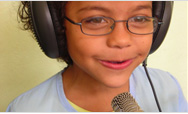You are here » Home » Telling Our Story
Success Story
Partners in business, and in life, make the most of their training
Husband and Wife Team Find Success

| |
Photo: ACDI-VOCA
|
|
Mohammed and Maua take a break from their busy day outside their home in Ushongo, Tanzania.
“I am proud to work with my wife. She works hard and deserves everything we’ve achieved. But we couldn’t have done all this without each other. We know just how much more you can achieve by working together,” said Mohammed, a fisherman-turned-businessman in Tanzania.
|
When it comes to successful business partnerships, Mohammed and Maua are an exemplary team. Married and living in Ushongo on Tanzania’s northern coast, Mohammed sells fish. On average, he nets about $4 a day in profit. Maua’s tea stall — a small but popular spot on the family porch — provides about one dollar of extra daily income.
Yet it’s the business they run together that has led to their biggest financial success. In 2002, USAID helped introduce the basic concepts of seaweed farming to their community. Mohammed and Maua saw their chance, and with the support of a private seaweed development company, C-Weed, they began farming seaweed seriously, with a joint commitment to succeed.
The couple, used to planning their activities day by day, struggled to make their part-time seaweed investment pay off. And while many of their friends abandoned their seaweed business, Mohammed and Maua persevered. Thinking back to the training he received with USAID’s support, Mohammed commented, “Before, we used to farm but didn’t think about, or even really understand, things like ‘profit margins.’ But the training enlightened us. Now we calculate things and work towards targets.”
Mohammed and Maua used their first seaweed profits to build a second home. Now, they rent out their first house and use the rent to support their children’s schooling. Their next target is to use the $22 from seaweed income they make each month for electricity and a freezer. With the wiring in place, they expect to turn on their lights soon. As for the freezer, they optimistically reply, “We think we’ll have saved enough by next month.”
The electricity will allow Maua to add a juice stall to her porch, and with the freezer, Mohammed can store bigger catches of fish for longer. Their next big goal is to buy a motorbike, so that Mohammed can get to work faster. He has been cycling for two hours each day to the local market along sand roads for the last 15 years. With a motorbike, he will carry more fish and cover more markets. For Mohammed and Maua, the days of subsistence thinking are long gone.
Print-friendly version of this page (400kb - PDF)
Back to Top ^ | 

